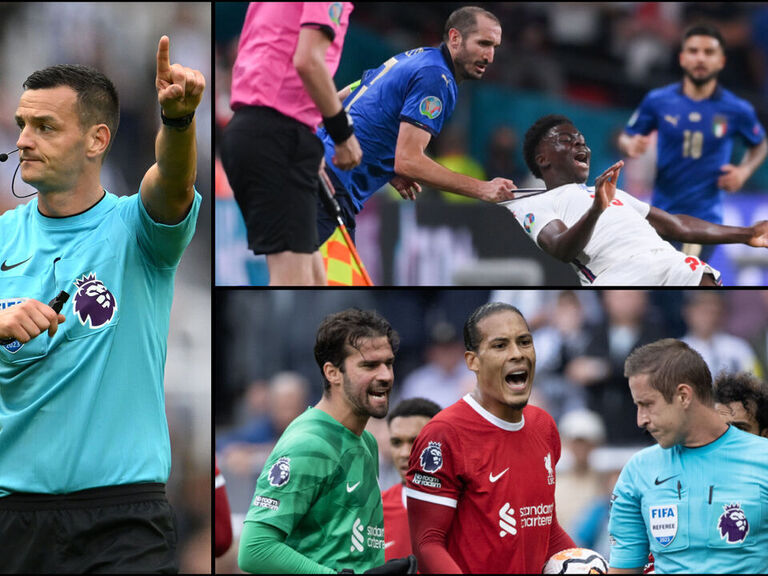Blue cards? Soccer risks losing fans with constant meddling

Find the biggest stories from across the soccer world by visiting our Top Soccer News section and subscribing to push notifications.
Blue cards were shown the red card, for now.
Soccer’s lawmakers, the International Football Association Board (IFAB), reportedly cowered from trialing a new card color to signal 10-minute sin-bin periods on Friday following widespread backlash to the plan. The punishment for players who commit cynical fouls or show dissent was due for top-level tests as soon as this summer and potentially in competitions as revered as the women’s and men’s FA Cups in England.
This isn’t the first example of the IFAB needlessly meddling with the world’s most popular sport – and it won’t be the last. Even this scatterbrained idea isn’t dead: Blue cards and sin bins will be up for discussion at the IFAB’s annual meeting in March.
The general consensus is that this latest initiative was plucked from the laws of rugby, along with another IFAB suggestion for only captains to discuss decisions with a match referee. Taking inspiration from a sport with limited appeal when compared to the global might of soccer, and one so complicated that it regularly offers in-game explanations of officials’ decisions to television viewers, seems rather peculiar.
FIFA was keen to distance itself from the IFAB experiments being held in professional soccer when the reports surfaced on Thursday. “Any such trials, if implemented, should be limited to testing in a responsible manner at lower levels,” world football’s governing body posted on X.
“It’s not football anymore,” UEFA president Aleksander Ceferin told The Telegraph when asked about his stance on sin bins in January. Ultimately, his opinion doesn’t matter. UEFA competitions must adopt whatever the IFAB adds to the laws of the game.
The blue-card bombshell followed a report by The Times’ Martyn Ziegler on Tuesday that claimed the IFAB was proposing “cooling-off periods” when on-pitch bickering is reaching breaking point and tempers are about to boil over.
Giving footballers toddler-esque timeouts and introducing blue cards would add more stoppages to a sport that prides itself on its flow and relentlessness. There would inevitably be consistency issues, too. The use of video assistant referees (VARs) has added an extra layer to the decision-making process, and with that, further risk of human error or differing interpretations. These risks range from egregious mistakes – such as Liverpool attacker Luis Diaz’s disallowed goal from an onside position against Tottenham Hotspur last September – to minor yet incessant quibbling, such as trying to determine if a player’s arm was in a “natural position” when they potentially committed a handball or, in the case of the latest changes, which words or actions constitute dissent.
(The confusion over the handball law is another matter bungled by the IFAB. Frankly, fans shouldn’t have to read up on the ever-changing rules to enjoy the sport to the fullest. This is meant to be a hobby, a form of entertainment. Watching football on Saturday shouldn’t be the sixth day of the working week. The IFAB is directly responsible for the current scenario where refereeing – and not actual football – often dominates the post-match conversation.)
The glaring and under-discussed problem linked to sin bins, timeouts, the implementation of VAR, and other changes to the on-pitch product is that fans weren’t asked if they wanted these things. Introducing harsher punishments for tactical fouls – which usually incur a yellow card – may prove popular among some supporters, but are sin bins really the best route? Would the risk of incurring a blue card encourage teams to swap an aggressive, attacking approach for a more conservative and ultimately less entertaining game plan? Will a goalkeeper vacate the net for dissent? Is 10 minutes too much? Does the opportunity to render more game-changing decisions nudge referees closer to center stage when players should always be the stars?
Perhaps we, the people who obsess over the sport, should be invited into the discussion. The IFAB – the self-described “independent guardians” of football’s rules – shouldn’t be so autonomous.
“I don’t know why they don’t leave the game alone at times,” said Everton’s Sean Dyche, who was among a stream of Premier League managers to voice opposition to the IFAB’s blue-card campaign. “I don’t think it’s needed, I don’t think it’s wanted.”
Tottenham Hotspur boss Ange Postecoglou noted that while “other sports are trying to make their games faster, we’re bringing in more clutter.”
A growing issue in football seems to be that executives and lawmakers are trying to look busy by making tweaks to the game without consulting fans, the lifeblood of the sport.



